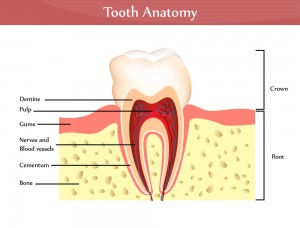 When you visit your dentist, do you feel like you’re in the dark? You don’t need to know what’s going on. You open your mouth, say “Ah,” and your dentist takes it from there. He or she knows what they are doing and we trust our dentist. It may be helpful, however, to be familiar with the anatomy of a tooth in case you need to make a decision concerning treatment. In today’s blog, your Livonia, MI dentist, Dr. James Stewart, is going to explain the basics of tooth anatomy.
When you visit your dentist, do you feel like you’re in the dark? You don’t need to know what’s going on. You open your mouth, say “Ah,” and your dentist takes it from there. He or she knows what they are doing and we trust our dentist. It may be helpful, however, to be familiar with the anatomy of a tooth in case you need to make a decision concerning treatment. In today’s blog, your Livonia, MI dentist, Dr. James Stewart, is going to explain the basics of tooth anatomy.
Eating For Healthy Teeth
 Remember when you were a child, how much you loved candy, ice cream, and soda? The same goes for your kids, right? One of their baby teeth must’ve been a sweet tooth. Your parents probably told you back then that you were going to rot your teeth, and they were right. All of that sugar does encourage tooth decay. If you want your children to eat for healthy teeth, stock your refrigerator and cupboards with healthy foods and snacks. If you have questions regarding healthy foods and tooth health, your Livonia, MI dentist, Dr. James Stewart will be happy to explain the effect eating healthy has on your children’s teeth.
Remember when you were a child, how much you loved candy, ice cream, and soda? The same goes for your kids, right? One of their baby teeth must’ve been a sweet tooth. Your parents probably told you back then that you were going to rot your teeth, and they were right. All of that sugar does encourage tooth decay. If you want your children to eat for healthy teeth, stock your refrigerator and cupboards with healthy foods and snacks. If you have questions regarding healthy foods and tooth health, your Livonia, MI dentist, Dr. James Stewart will be happy to explain the effect eating healthy has on your children’s teeth.
Involve your Family in Excellent Oral Hygiene
 If anyone in your family has unhealthy teeth and gums, the domino effect on future oral and overall health is scarier than you may realize. Certain dangerous health conditions (heart disease, strokes, cancer, Alzheimer’s) are all linked to the bacteria which breed in your mouth. If you want to eradicate these “bad guys” so you and your family’s oral-systemic health is as good as it possible, you must keep up with your preventive dental care.
If anyone in your family has unhealthy teeth and gums, the domino effect on future oral and overall health is scarier than you may realize. Certain dangerous health conditions (heart disease, strokes, cancer, Alzheimer’s) are all linked to the bacteria which breed in your mouth. If you want to eradicate these “bad guys” so you and your family’s oral-systemic health is as good as it possible, you must keep up with your preventive dental care.
Explain the Purpose of Oral Hygiene
Most children aren’t likely to feel terribly excited about brushing their teeth. One of the most common complaints of patients who are also parents is how to inspire their children to properly clean their teeth without a huge struggle. Kids are naturally inquisitive, so try talking to them about the importance of dental health, and implications of neglect. “Do it because I said so,” doesn’t tend to go very far with our modern day American children. Capitalize on their natural intelligence by highlighting the reasons behind wanting them to floss and brush their teeth with care.
Children Under 9-years-old
Sensitive Teeth And Seniors
 Do you flinch because your teeth hurt when you drink something hot or cold? Have you noticed your gums lately? Do they look red or swollen, or are they pink and healthy? As we age, so do our teeth and gums. Our teeth can become discolored, stained, and worn down. Our teeth are much more noticeable than our gums. But gum health is very important to tooth health. If you are suffering from tooth sensitivity consult your Livonia, MI dentist, Dr. James Stewart. He will be happy to discuss the reasons behind tooth sensitivity and available treatments.
Do you flinch because your teeth hurt when you drink something hot or cold? Have you noticed your gums lately? Do they look red or swollen, or are they pink and healthy? As we age, so do our teeth and gums. Our teeth can become discolored, stained, and worn down. Our teeth are much more noticeable than our gums. But gum health is very important to tooth health. If you are suffering from tooth sensitivity consult your Livonia, MI dentist, Dr. James Stewart. He will be happy to discuss the reasons behind tooth sensitivity and available treatments.
Answers To Your Questions About Tooth Fillings
According to the National Institute of Dental and Craniofacial Research (NIH), 59% of adolescents 12 to 19, 92% of adults 30 to 64, and 92% of seniors 65 and older have had dental caries (cavities) in their permanent teeth. Tooth decay is a progressive bacterial infection affecting your teeth. It continues to eat away your tooth structure if allowed and may migrate into your gums and jawbone if left untreated. If discovered in time, the decay can be removed, and a filling can be placed to prevent further infection. Dr. Stewart answers a few questions about tooth fillings and restorative dentistry below.
Frequently Asked Questions
Q: What Is A Tooth Filling?
A: A filling is a type of restorative dental procedure to repair minimally damaged portions of the teeth due to cavities, fractures, or unusual use. Dr. Stewart prefers placing composite resin fillings because they are biocompatible and do not contain mercury, a harmful heavy metal found in silver fillings. Composite resins consist of a tooth colored bond mix that hardens when cured.
Q: How Is A Filling Placed?
A: Your dentist will begin with removing the decayed portion of the tooth. Anesthetic is available and is usually administered to reduce discomfort. Once the decay is removed, Dr. Stewart will shape the cavity to place a filling. Soon after, the doctor will fill the cavity with a composite resin bonding material. A curing light is used to harden the tooth filling, and the doctor will shape the filling once hardened to match the repaired tooth’s curvature.
Q: What’s The Difference Between Amalgam (Silver) Fillings And Composite Resin Fillings?
A: The following list shows the advantages of composite resin fillings over amalgam fillings:
- Do not contain mercury, a harmful heavy metal
- Tooth colored (virtually unnoticeable)
- Bond directly to tooth, creating a stronger structure
- Require less removal of enamel
Q: Who Is A Candidate For Tooth Fillings?
A: Depending on existing enamel and overall oral health, many people are candidates for tooth fillings. The purpose of a filling is to prevent the progression of decay, which means treating it early and often with regular dental checkups and cleanings.
About Dr. Stewart
James R. Stewart, Jr, DDS, PC and our compassionate staff proudly serve patients of all ages from Livonia, Farmington Hills, Plymouth, Northville, Dearborn Heights, Garden City, and all surrounding communities. To schedule an appointment, call our office today at (734) 425-4400.
Your Temporomandibular Joint (TMJ)
Similar to the high temperature of a fever, discomfort or pain related to TMJ disorder signals an issue, but it does not point directly to the source. Common symptoms such as a headache, earache, or muscle soreness in the face could point to other outliers. (more…)
Gum Disease Symptoms And Treatment
Most people are aware that gum disease exists. However, a large majority of people don’t understand how the disease progresses or how to prevent it from occurring. Nearly half of adult Americans have a gum condition diagnosed as gingivitis or periodontitis. No matter the stage, the disease is serious and can cause more grief if not treated promptly. Understanding that people are usually informed about something and not how it functions, Dr. Stewart takes the time to explain periodontal disease symptoms and treatments. (more…)
A General Dentistry Quiz On Checkups and Cleanings
Have you done your spring cleaning, yet? Like spring cleaning, dental checkups and cleanings tend to get swept under the rug. People are busy with work, family, and hobbies, so much so, that visiting the dentist remains in the back of their mind as a reaction instead of a proactive effort. If you didn’t already know, tooth decay and gum disease are silent until discomfort surfaces. (more…)
An Oral Cavity Isn’t An Empty Hole
Hopefully, you’ve been teaching your children to brush their teeth at least twice a day and floss in between meals to ensure oral health until their regular dental checkup and cleaning. Otherwise, disease that affect the teeth and gums could develop, specifically cavities. According to National Institute of Dental and Craniofacial Research, 42 percent of children 2 to 11 have had dental caries (cavities) in their primary (baby) teeth. (more…)
Children And Their Habits
As children mature from infancy to toddler to teen, they experience a variety of situations that may cause a myriad of emotions. Most of these emotions they will experience for the first time, and what better way to handle the external pressure than to revert to comfort. A pacifier or thumb, similar to blankets and soft toy-animals, may provoke the feeling of safety and reassurance when called upon. Although seemingly harmless, pacifiers and thumbs could be harming your child’s oral health and development. Dr. Stewart, offering children’s dentistry services, discusses the effect of each habit your child may be forming. (more…)


